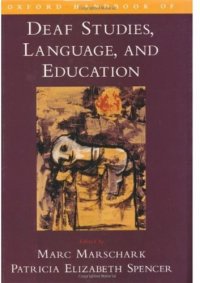
Ebook: Oxford Handbook of Deaf Studies, Language, and Education (Psychology)
- Year: 2003
- Publisher: Oxford University Press
- Edition: 1
- Language: English
- pdf
In Plato's cratylus, which dates to 360 B.C., Socrates alludes to the use of signs by deaf people. In his Natural History, completed in 79 A.D., Pliny the Elder alludes to Quintus Pedius, the deaf son of a Roman consul, who had to seek permission from Caesar Augustus to pursue his training as an artist. During the Renaissance, scores of deaf people achieved fame throughout Europe, and by the middle of the 17th century the talents and communication systems of deaf people were being studied by a variety of noted scientists and philosophers. However, the role of deaf people in society has always been hotly debated: could they be educated? Should they be educated? If so, how? How does Deaf culture exist within larger communities? What do advances in the technology and the genetics of hearing loss portend for Deaf communities? In this landmark volume, a wide range of international experts present a comprehensive and accessible overview of the diverse field of deaf studies, language, and education. Pairing practical information with detailed analyses of what works, why, and for whom, and banishing the paternalism once intrinsic to the field, the handbook consists of specially commissioned essays on topics such as language and language development, hearing and speech perception, education, literacy, cognition, and the complex cultural, social, and psychological issues associated with individuals who are deaf or hard of hearing. Through careful planning, collaboration, and editing, the various topics are interwoven in a manner that allows the reader to understand the current status of research in the field and recognize the opportunities and challenges that lie ahead, providing the most comprehensive reference resource on deaf issues. Written to be accessible to students and practitioners as well as researchers, The Oxford Handbook of Deaf Studies, Language, and Education is a uniquely ambitious work that will alter both theoretical and applied landscapes. It surveys a field that has grown dramatically over the past 40 years, since sign languages were first recognized by scientists to be true languages. From work on the linguistics of sign language and parent-child interactions to analyses of school placement and the mapping of brain function in deaf individuals, research across a wide range of disciplines has greatly expanded not just our knowledge of deafness and the deaf, but of the very origins of language, social interaction, and thinking. Bringing together historical information, research, and strategies for teaching and service provision, Marc Marschark and Patricia Elizabeth Spencer have given us what is certain to become the benchmark reference in the field.
Download the book Oxford Handbook of Deaf Studies, Language, and Education (Psychology) for free or read online
Continue reading on any device:

Last viewed books
Related books
{related-news}
Comments (0)